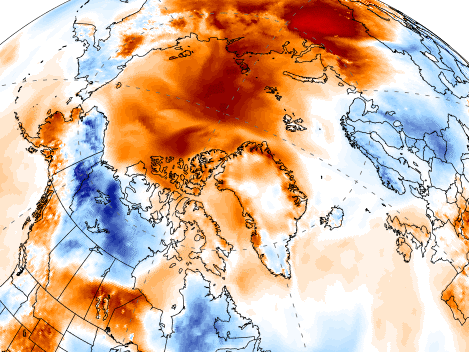Climate crisis: Arctic temperatures ‘break records’, as ice melting season starts early
Temperature spike is highest this early in the year since at least 1958, scientists suggest

A heatwave is underway in the Arctic unusually early in the year, with temperatures reaching record highs for spring and kickstarting an earlier annual melting season, scientists have found.
An anomalous high pressure weather system over the North Pole has seen temperatures soar, with some parts of Siberia recording highs of over 20C.
This warm air over Russia has created a “highway” to the pole, transporting unseasonable warmth north into the Arctic. Meanwhile, colder air is moving south into Scandinavia and North America.
The current temperature spike follows a considerably warmer April than normal for the Arctic. In mid-April average temperatures reached highs of more than 0C, meaning overall some recordings were up to 20C above the long-term normal values for the area, according to data collected by Nasa and other agencies.
Speaking to The Independent about the record-breaking data, climate scientist Martin Stendel of the Danish Meteorological Institute said “the temperature anomalies in the high Arctic and large parts of Siberia are indeed quite extreme”.
“I could not find anything comparable for the high Arctic in a data set which goes back to 1958.”
“There is no similar event so early in the season” on record, he said.
Temperature anomaly analysis carried out by Severe Weather Europe, which provides centralised information gathering and sharing of climate and weather data from Europe, said over the weekend warm spots inside the Arctic circle were 12C above normal.
The average April global air temperature was +1.16C above the 1951-1980 climate baseline.
The disparity between the rest of the world and what is occurring over the North Pole reflects how the Arctic is warming much more rapidly than anywhere else.
The warm spring is among the factors which have led to the beginning of an early melt season in Greenland.
The onset of the melt season at the beginning of the summer is defined as the first of three days in a row with a melt extent exceeding 5 per cent over the ice sheet. The onset in 2016 was the earliest on record and happened on 11 April with an even larger anomaly. This year the melt season officially began on May 16.
Dr Stendel said: “The median is 26 May, so we are almost two weeks early, which puts 2020 on rank 10 of the 40 years 1981-2020 we have data for.”
The historic rise in spring temperatures comes as wildfires in Siberia and the Russian Far East have become as much as ten times worse compared to this time last year, according to the Siberian Times this month.
Emergencies Minister Evgeny Zinichev warned in a video conference with Vladimir Putin various factors had contributed to the problem which now poses a threat to people across many areas of Russia.
“A critical situation with fires has developed in Siberia and the Far East,” Mr Zinichev warned.
He said the main cause is “unauthorised and uncontrolled agricultural fires”, but he also blamed “a less snowy winter, an abnormal winter, and insufficient soil moisture [as] factors that create the conditions for the transition of landscape fires to settlements.”
He added that hot weather and strong winds had also complicated the threat.
In total 3,339 fire outbreaks were recorded by the end of April, compared with 1,960 over the same period last year.
Scientists have also said there is “strong evidence” last summer’s unprecedented Arctic wildfires may have survived in some areas, smouldering during winter and have reignited as “zombie fires” this month, the New Scientist reports.
Subscribe to Independent Premium to bookmark this article
Want to bookmark your favourite articles and stories to read or reference later? Start your Independent Premium subscription today.

Join our commenting forum
Join thought-provoking conversations, follow other Independent readers and see their replies